



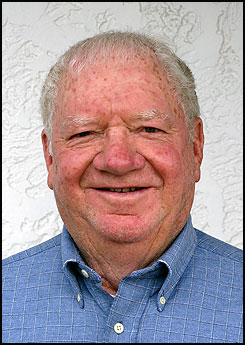
I grew up on a 160 acre dairy farm in Jackson County. My parents purchased the farm after my father returned from serving in the US army in Italy during WW2 and we had cows, chickens and pigs. I was always busy doing all the things that farm kids do; milking cows, driving the tractor, gathering eggs, roaming the woods and playing in the creek that ran through our farm.
After high school I attended 2 years of college at UW Lacrosse and then transferred to the engineering department at UW Madison. Graduating with a BS in chemical engineering in 1965 I started my first engineering job at Globe Union (now Johnson Controls) in Milwaukee. My job as a process engineer was to make improvements to the way huge blocks of lead were turned into lead acid batteries that are used to start automobile engines.
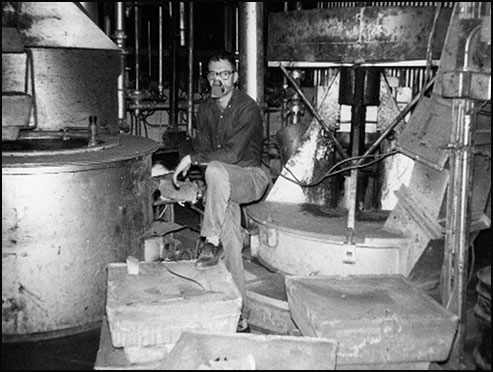
Converting blocks of lead
to lead oxide powder
With the accepted technology at the time there was a lot of waste lead oxide and sulfuric acid that were being discharged to the sewer. We wore protective clothing and a dust respirator to minimize the inhalation of lead oxide dust and safety glasses as protection from molten lead. I soon became interested in learning more about wastewater treatment and waste minimization to move my career in that direction.
Marquette University offered a series of evening engineering course where I could continue to work full time and enroll in one evening course each semester to earn a MS degree in civil/sanitary engineering. For my masterís thesis I set up a wastewater treatment pilot plant in the battery factory and experimented with several treatment units on a small stream of their wastewater.
When the Clean water act was passed in 1972 the DNR was designated as the agency to administer the law and in 1973 I was hired as an environmental engineer in the Industrial Wastewater Section by Carl Blabaum and Paul Didier. My first office was in the Pyre square building and my job was to draft WPDES (Wisconsin Pollutant Discharge Elimination System) Permits. All Industrial and municipal wastewater was required to be treated in a system designed to remove most of the pollutants before discharge to waters of the state. This was exactly what I had trained for and it was very exciting to be implementing this successful environmental law.
Before the Clean water act the DNR (then called the Board of Health) had struggled to control pollution by issuing orders. As a result most dischargers had primary treatment but there was resistance to spend more on wastewater treatment if only Wisconsin was requiring it. However when it became a national law industries began to move rapidly to design and build wastewater treatment plants.
Before we could write a WPDES industrial wastewater discharge permit we needed to know about what products they produced and what the waste streams are. The best memories of my DNR career was my visits to so many factories to see how things are made. I visited cheese factories, meat processors and vegetable canneries including sweet corn, beans, peas, pickles, sauerkraut, beets and potatoes. It was exciting to see how changes in technology affected the waste management. When I started at DNR whey, the byproduct of cheese making, was a difficult to dispose of waste and much of it was dumped into earthen pits to seep into the ground. Gradually whey processing machinery was developed to condense and dry the whey for animal feed. Now much of the whey is fractionated by ultra-filtration into a protein and a lactose sugar fraction which are marketed as a human food product. The Industrial wastewater Section was eventually split into a Physical Chemical Unit and a Biological Treatment Unit and I was promoted to leader of the biological unit.
When the DNR was reorganized in the mid 90ís I had an opportunity to transfer to a business sector specialist position. This was a new type of job where the specialist would become familiar with certain business sectors and work cooperatively with the sector to improve relationships with the DNR. One of my sectors was aquaculture and I would organize periodic meetings of private fish farmers with appropriate DNR staff to discuss issues such as digging ponds, discharging water from their fish ponds, bait fish harvesting and importing fish from out of state. I also was the food processing and asphalt sector specialist. I retired from this position in 2007.
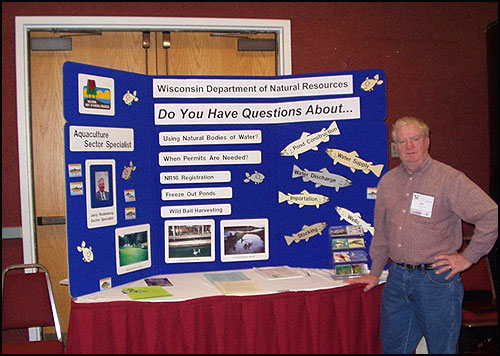
My display at a Wis. Aquaculture Association convention
My wife Sandy and I have been married since 1965 and we have 3 children. Sandy was an in home day care provider and we enjoy keeping in contact with her cared for children especially those of my DNR co-workers. Our oldest son Dennis is a UW engineering graduate and is currently the campus physical plant engineer at UW Lacrosse. Our daughter in law Julie manages the Lacrosse Veterinary Clinic. They have one 15 year old son Alex. Our second son David is also a UW engineering graduate and works in heating, ventilating and air conditioning for LONG Building Technologies in Denver, CO. Our daughter in law, Lynda, recently retired as an owner of a mechanical engineering firm in Denver and went back to school to become a veterinary technician. Our daughter Julie has a PhD in forestry economics and is DNRís forestry economist. Jeff, our son in law is a computer programmer. They have a 3 year old son Emmett and an infant daughter Madeline.
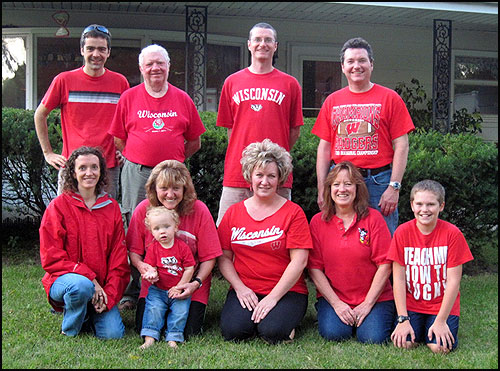
Back row from left: Jeff, Jerry, Dennis, David; Front: Daughter Julie, Sandy, Emmett, daughter in law Julie, Lynda and Alex
As a family our favorite activity was camping in DNR parks and all over the US. Sandy and I were both involved in leadership of Boy and Girl Scout troops and traveled to many places throughout the US by bus. Our favorites were Yellowstone, Grand Tetons and The Philmont Scout Ranch.
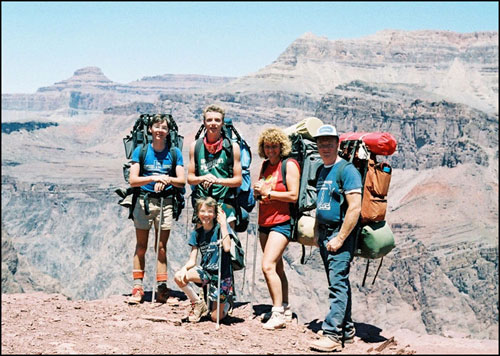
Backpacking to the bottom of the Grand Canyon in 1987
After our kids were out of scouting we continued backpacking trips to our favorite places which are Appalachian Trail, Teton Crest Trail and the Bright Angel Trail down into the Grand Canyon.
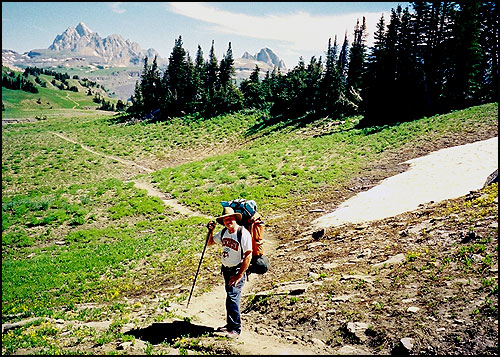
Backpacking on the Teton Crest Trail in Grand Teton National Park in 1999
We currently have a comfortable camper trailer and enjoy camping in Wisconsin and everywhere in the US. Hunting and fishing have always been my favorite outdoor activities. I manage the family farm as a partnership with my brother and sister and in the summer I am one of the volunteer drivers for Madison Metropolitan School District pontoon boats on Madison Lakes.
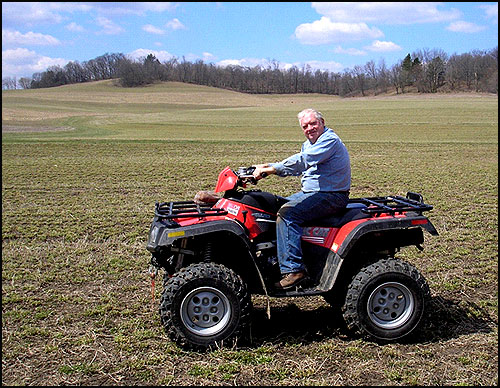
Riding the fence line on our family farm